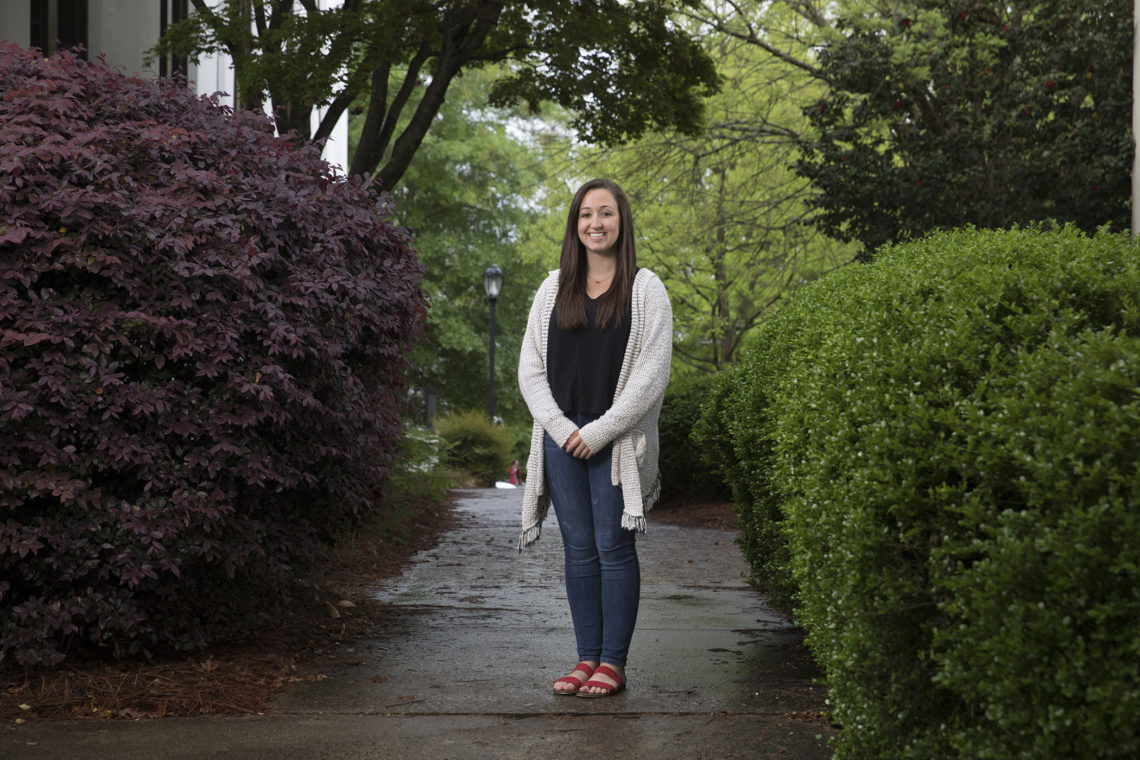Elizabeth Medlock’s grandfather left a lasting impact on her life. And her career path.
In 2016, Medlock, a then-finance major, learned about her grandfather’s visit to the audiologist at a local clinic.
“I didn’t even know what audiology was three years ago,” she said.
She learned about the hearing tests, how they fitted him for his hearing aid. The science intrigued her.
Coincidentally, Medlock enrolled in an American Sign Language class in the College of Education at the University of Georgia that next semester. She knew people who used the language and loved the idea of being able to communicate with the deaf community.
Elizabeth Medlock signs her sign language name, Eyelashes.
Little did she know that her dream career was at the intersection of these two life events.
Raised in a family of Georgia Tech engineers, Medlock has always loved math and science. But when she got to college, she realized she wanted to work with people. Finding a career that marries the analytical aspects of math and science with personal interaction can be a tough combination to find.
“Audiology combines the things I’m good at with the things I like,” Medlock said. “There’s a lot of physics that goes into audiology, and you’re also getting to help people at such a personal level.”
Audiologists are specialists who diagnose and treat hearing and balance problems. A typical day can involve hearing tests, hearing aid fittings and discussions about cochlear implants with a range of patients from newborns to older adults.
Medlock knew her goal was to enroll in a four-year clinical doctoral program for audiology, but to get the proper foundation as an undergraduate, she switched her major to linguistics. Through this major, she studies a wide range of language-related aspects such as language development in children with normal hearing versus those with hearing loss. She also committed to ASL as her major language, allowing her to focus on the language for at least four semesters.
She is currently in her second year of research through CURO, the Center for Undergraduate Research Opportunities, with Sandie Bass-Ringdahl, clinical associate professor and program director in the department of communication sciences and special education. She’s studying the connection of early detection hearing loss and language outcome scores in elementary-aged children.
Her ultimate goal is to connect the field of audiology with her ASL training.
“Less than 10 percent of audiologists use ASL. Instead of having an interpreter or communication barrier, I want to figure out how to integrate the two,” she said.
She also observed at the UGA Speech and Hearing Clinic in the College of Education. It’s a clinic for the Athens-area community that employs a fully accredited audiologist and gives Medlock a chance to work with a range of patients.
Medlock, who is graduating from UGA this spring, credits her professors and mentors at UGA for helping her land a coveted spot in the audiology program at the University of Louisville, where after graduating May 10 she’ll start classes this fall. The University of Louisville is one of only 74 audiology programs in the country.
“Dr. Bass-Ringdahl opened my eyes to so many things in the field of audiology,” she said. “She, Dr. Holly Kaplan of the Speech and Hearing Clinic and Brian Leffler, my ASL teacher, were my three biggest supporters. I can’t imagine my college career without them.”
Medlock isn’t exactly sure what her future career looks like. She’s considered opening her own practice, working with veterans, or even starting a traveling audiology clinic that would stop at nursing homes, patient’s homes or deaf community organizations.
“My mom keeps joking that I should get a van shaped like an ear,” she laughed.
Even though the path isn’t clear just yet, she knows the population she wants to serve. The same group that helped her find her passion in the first place: older adults.
“The older population has so many stories to tell, so many life experiences to share,” she said. “It’s an underserved population. I just want to help as many people as I can.”








